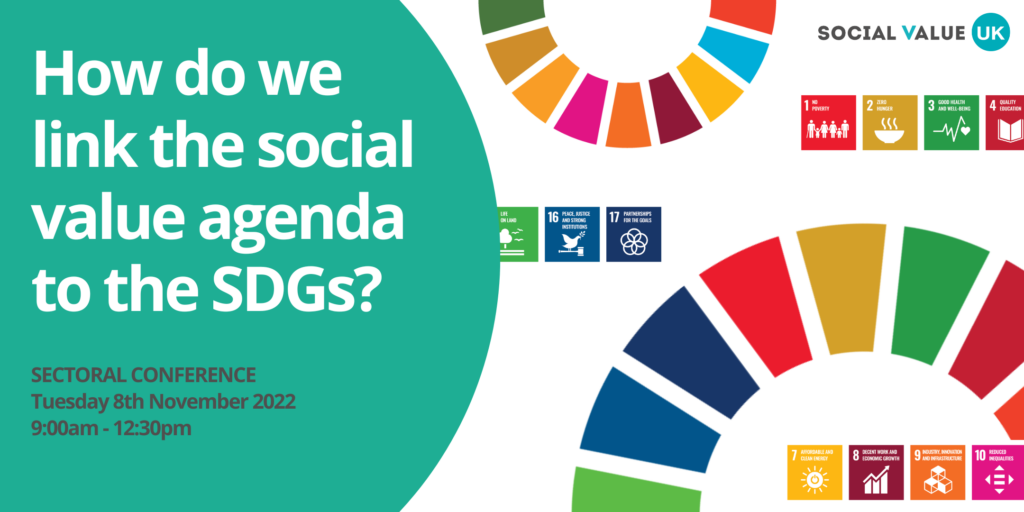
Posted 9th November 2022
Our second private sector conference started by discussing what sustainable development is and what it means for people. With the image and personal story of a grandfather in Zimbabwe who only wished for the best future possible for his grandsons, our co-CEO Crispen Sachikonye, brought the understanding of a sustainable future to life through our personal experiences of our lives and those of the future generations we are connected to.
He went on to explain how the shared agenda for a better future was developed through consultation with 10 million people that resulted in the 17 Sustainable Development Goals (SDGs). His grandfather had not been one of these people consulted, but many voices like his had been heard as a plan of action was put together. This is the plan that the UK is acting to as well, as the Social Value Model links to the SDGs and the Model’s Themes, such as COVID recovery and wellbeing, reflection on UK stakeholders’ challenges. Seeing the wider picture and understanding where you fit in that context, is also what the Social Value International backed SDG Impact Standards are about and to help us make better decisions.
Crispen’s opening also pointed out we need to bring this into our conversations and language. How do we link all of the important topics and agendas together – and more precisely – How do we link the social value agenda to the SDGs?

We were honoured to out of many fantastic speakers have Jeremy Nicholls, Assurance Framework Lead for SDG Impact Standards at UNDP delivering a thought-provoking keynote with an eye-opening insights to the challenges in the world, with issues such as gender equality being over 100 years off and assurance missing in carbon trading. But with John Lennon’s words of “imagine” he also shared news and developments (e.g. SDG Impact Standards) that can support enterprises to act.
Panel 1: Another Acronym?
With the four panellists Oliver Kempton, Partner at Envoy Partnership, Sarah Fasey, Social Value Lead at Microsoft, Bonnie Chiu, TSIC and Ed Gemmell, Leader of Climate Party & Scientist Warning Europe and a discussion facilitated by our Private Sector Lead Charlotte, this discussion that started with reference to the Linking the SDG and SVI approaches paper; quickly dived into the debate around what to prioritise (e.g. climate change compared to inequality) which so clearly showed the importance of understanding the interconnectedness between the many SDGs. The SDGs can help bind things that are important to organisation, as Sarah explained. Bonnie made a good point around how debating about what Goal to focus on missed the core point of being an approach (and acronym) that different to many other acronyms resonates with a wider range of stakeholders across sectors and countries.
But we’re still far off to achieve all of the Goals, so what’s next, when we reached 2030? The panel provided everything from doom day perspective to kick us into action, but as Oliver also pointed out, we should not forget that we’ve also made great strides globally on areas such as reducing extreme poverty. There’s still hope, was the flavour our panelists left the audience with as the first panel finished.
Presentations
The first panel was followed by two presentations. One by David Connor, Founder of The 2030 Hub, who talked about Local Action and Private Sector, giving real grass route examples of the importance to speak the (cultural) language of your stakeholders and how to make this relevant for …a kebab shop! No one should be left behind and this agenda is wide and inclusive enough to make that happen.

This was followed by Sarah Ottaway, Sustainability and Social Value Lead for Suez, who provided a crash-course on the Climate Crisis and then very elegantly linked real business related challenges with how the Principles of Social Value can help to tackle these.
In the informal networking that followed, the attendees took the opportunity to continue the discuss if our democratic systems are fit for purpose and to support the SDGs, SME support and some general reflections from the day.
Panel 2: The business practice and opportunity
The second half of the conference started mid-morning with presentations by Jessica Lobo, Global Goals and Climate Programme Manager at UN Global Compact Network UK, James Williams, Head of Social Impact at HACT, Ellie Jenkins, Partner of Akerlof & Rab Campbell, Growth Manager at The Social Value Engine and a panel facilitated by our Operations Director Catherine Manning. The speakers clearly showed how their different solutions helped businesses understand and take actions towards the SDGs, but it was also recognised that it is a complex reality we’re facing that can feel really hard. That’s why many need help to navigate through this, and Jess emphasised the value of the SDGs to give the problems we’re trying to solve attention and to help translating these global challenges into what’s relevant locally.
Members discussion
Seeing a trend in language, we need our community to speak in a way that resonates with people: Stakeholders that can sometimes be a grandad in Zimbabwe or a Kebab shop in Liverpool, Crispen started the last part of this conference with. “And here we do have work to do”, he said, before opening up the conversations with attendees on they thought needed? What’s next? To which the attendees’ thoughts and suggestions for action flew through the chat:
- “Bring Procurement Officers into the family”
- “Help smaller business develop their sustainability goals”
- “Share guidance, case studies etc on how organisations of all sizes can engage with SDGs through their Social Value policy/framework/agenda.”
- “Sharing good practice and educating companies on how to identify risks and impacts in their operations and, very importantly, in their supply chain. I also think that reporting is crucial for this”
- “[…] introduce a conversation around how SDGs and social value to other existing frameworks [where it’s currently not mentioned]”
- Support to influence leaders
- There is a role for SVUK and members in advocating for interconnected nature of people and planet, and the need for us to collectively be developing measurement and management practice that integrates both
On the first one, we’ve already taken the action to bring this up with the Contract for Change Thought Leadership Group which is a multi-stakeholder initiative to influence the future of procurement. But now we’re inviting your action and ideas to push the other points forward. Please get in touch with Charlotte at [email protected] if you would like to co-lead on what could be our network’s answer to these raised SDGs challenges.
On reflection, this event created a lot more discussions and debate than what we had anticipated. It was fantastic to see the passionate speakers and active attendees getting involved, but one thing was clear: There are more questions to be answered and work to be done to better implement the organisational systems, actions and assurances needed to link the social value agenda to the SDGs. And our last sentence today is a shout out to our network to join us and get in touch if you’d like to get involved.
If you missed this conference, it’s still not too late to watch it. The recordings are now available for purchase, please contact [email protected] to gain access
